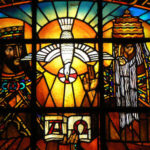We run our website the way we wished the whole internet worked: we provide high quality original content with no ads. We are funded solely by your direct support. Please consider supporting this project.

How the Holy Spirit Changes Us
The Bible is full of stories of people who experienced the presence of God. If we are to experience something similar today, we must, through the Spirit, cultivate the spiritual capacity of an inner life to see and hear spiritual things. Paul wrote:
Now the Lord is the Spirit, and where the Spirit of the Lord is, there is freedom. And all of us, with unveiled faces, seeing the glory of the Lord as though reflected in a mirror, are being transformed into the same image from one degree of glory to another, for this comes from the Lord, the Spirit. (2 Cor 3:17-18)
This Spirit-inspired “seeing” of Jesus changes our being. As we see his glory, we are transformed into his likeness “from one degree of glory to another.” This is, in essence, how the fruit of the Spirit is produced in our lives. When we cease from striving in our own effort and yield to the Holy Spirit, and when our faith ceases to be merely intellectual and rather becomes experiential and concrete, our lives begin to reflect Christ’s image.
It is what we see, not how hard we strive, that determines what we become.
This “seeing” is of a spiritual sort. Paul uses the Greek word katoptrizo, which literally means “to look at a reflection.” This reflection is in our minds. According to the teaching of Paul that follows the passage quoted above, believers have an ability to see in the mind. The “image of God,” the “face of Jesus Christ,” enlightens the mind of the believer. The mind of the believer can be “controlled by the Spirit” (Rom 8:6).
The place where the Spirit produces a reflection of “the glory of God in the face of Jesus Christ” (2 Cor 4:6) is in the regenerate mind of the believer. It is through this spiritual mental vision that we are “transformed by the renewing of [our] minds” (Rom 12:2) and set free from the pattern of this world.
While all believers have this capacity, however, we don’t necessarily use it. Though we are regenerate and have a new nature, we still struggle to “take every thought captive to obey Christ” (2 Cor 10:5). We yet have aspects of our minds veiled and thus experience ourselves as through we were not all God says we are in Christ. Our tendency to trust our own efforts to bring about transformation plays into this ongoing veiling of our minds.
We need to recover our sense of dependency on the Spirit of God rather than our own effort and recover the use of the imagination in our relationship with God to experience the transformation of which Paul spoke. We need to learn how to “fix our eyes on Jesus” and “set [our] minds on things that are above.”
We become what we imaginatively see. If all we imaginatively see are the vivid re-presentations that have been instilled in us by the pattern of this world, we will be conformed to the pattern of this world. But if we learn to imaginatively see “the glory of God in the face of Jesus Christ” (1 Cor 4:6), we will be transformed “from one degree of glory to another” (2 Cor 3:18).
—Adapted from Seeing Is Believing, pages 86-94.
Image by ramsesoriginal via Flickr
Category: General
Tags: Imagination, Imaginative Prayer, Seeing is Believing, The Holy Spirit
Related Reading

A Brief Theology of the Trinity
“The economic Trinity is the immanent Trinity, and the immanent Trinity is the economic Trinity.” This is the maxim introduced by the Catholic theologian Karl Rahner that should shape our discussion of the Trinity. It is simply a short-hand way of saying that since the way God is toward us in Christ truly reveals God,…

Podcast: Must We Try So Hard to Listen to God?
Cody and Dan are walking in darkness. Greg tries to show them the light. Also, consider supporting ReKnew. You can do so HERE. http://traffic.libsyn.com/askgregboyd/Episode_0437.mp3

How Do You Balance Productivity and Spiritual Health?
In this episode Greg talks about balancing a productive life with a spiritually healthy one. Links: Book: Seeing is Believing http://traffic.libsyn.com/askgregboyd/Episode_0019.mp3

The Holy Spirit Behind the Scenes
In John 17 we read Jesus’ prayer to be one with each another in Christ. Jesus prayed that his disciples … may be one. As you, Father are in me and I am in you, may they also be in us. … I in them and you in me, that they may become completely one,…

Podcast: How Does God Influence Us?
Greg discusses the problem with speculating on HOW God interacts in the world. http://traffic.libsyn.com/askgregboyd/Episode_0265.mp3

How to be Transformed
We are transformed as we gaze upon the beauty and glory of God. Paul put it this way, “And we all, who with unveiled faces contemplate the Lord’s glory, are being transformed into his image with ever-increasing glory, which comes from the Lord, who is the Spirit.” (2 Corinthians 3:18). This occurs as we cease…
